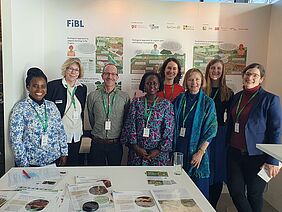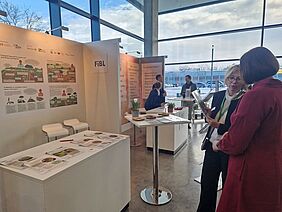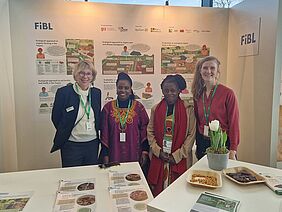The GFFA is also known as the "Davos of agriculture". Many prominent European and global ministers and experts from the agricultural scene meet here in mid-January on the fringes of the International Green Week in Berlin.
Prominent visitors to the FiBL stand
As usual, the broad motto of the event was "Food systems of the future: Together for a world without hunger". Special attention was paid to food security in times of crisis.
FiBL also participated this year, showcasing its work in the Innovation Forum event. The theme of the FiBL stand was "Promoting sustainable production and food sovereignty - Strengthening smallholders".
The stand, headed by Beate Huber, Vice-chairwoman of the Management Board of FiBL Switzerland, was well attended. Guests included ministers, state secretaries and other high-ranking representatives from public authorities and private institutions from all over the world.
Popular training materials
According to Irene Kadzere, research associate at FiBL, the institutes training materials and the policy dossier on the topic mentioned above were particularly well received. The chocolate on offer and the dried mangoes served with it were also very popular with visitors.
The fact that an organic representative held the opening speech at the ministerial conference caused quite a stir at the GFFA. This honour fell to Helmy Abouleish. He is President of Demeter International and CEO of Sekem, an Egyptian development organisation with close ties to agriculture. Eva Goldmann from FiBL was able to ask Abouleish a few questions before his presentation in Berlin.
Mr Abouleish, you will have people in front of you at the GFFA, many of whom see things somewhat differently than you. Is it possible to come together?
Helmy Abouleish: I'm only describing what already exists. I'm not giving a theoretical lecture, but reporting on what we are already successfully implementing with thousands of farmers in Egypt and what we want to implement here with 40,000 farmers over the next two years: How can we help them with the transformation to organic farming? And how can we find ways to improve their incomes and products by paying for their ecosystem services? We need to enable them to sell these products on the local market at conventional prices so that customers in Egypt no longer have to pay for these products.
How willing are the Egyptian consumers to buy organic products?
We sell 80 percent of our products in Egypt but can't count on a significant demand for organic products. But organic and biodynamic don't have to be more expensive. It only looks that way because the externalised costs are not included.
Is there already widespread awareness regarding the benefits of organic farming and Demeter in Egypt?
More and more. In the rural population, where farmers use a lot of synthetic pesticides and fertilisers, there is a noticeable movement away from them. Many small farms aim to move away from pesticides. Farmers feel that health and these products do not go together. In the city, there is also the component of good education. But the ability to pay more for the products is just as limited as in Europe. That is why it is so important to advocate for the true costs.
Organic sales have recently stalled somewhat, is this just a temporary stuttering of the organic engine or do you fear a longer-lasting trend?
In the long term, there is no other way forward than more sustainable agriculture, value chains and, of course, consumption. But this transformation will not happen all at once. However, many still benefit from the old system and will continue to try to maintain it for a very long time. That's why we in the organic scene also need to offer an alternative at no extra cost to those consumers who can't afford a higher price. As we know that we are not more expensive given the real costs when the true price is considered, I am not worried. It simply takes a little time for this to be recognised in politics and the value chains. If we use carbon credits in the meantime, that will help us to complete the transformation.
Author: Adrian Krebs, FiBL
Further information
Contact
Links
- orgprints.org: The FiBL policy dossier "Cultivating change with agroecology and organic agriculture in the tropics: Bridging science and policy for sustainable production systems"
- gffa-berlin.de: FiBL on the website of the GFFA
- gffa-berlin.de: The results of the Agriculture Ministers' Conference
- Helmy Abouleish's speech (1.7 MB)






